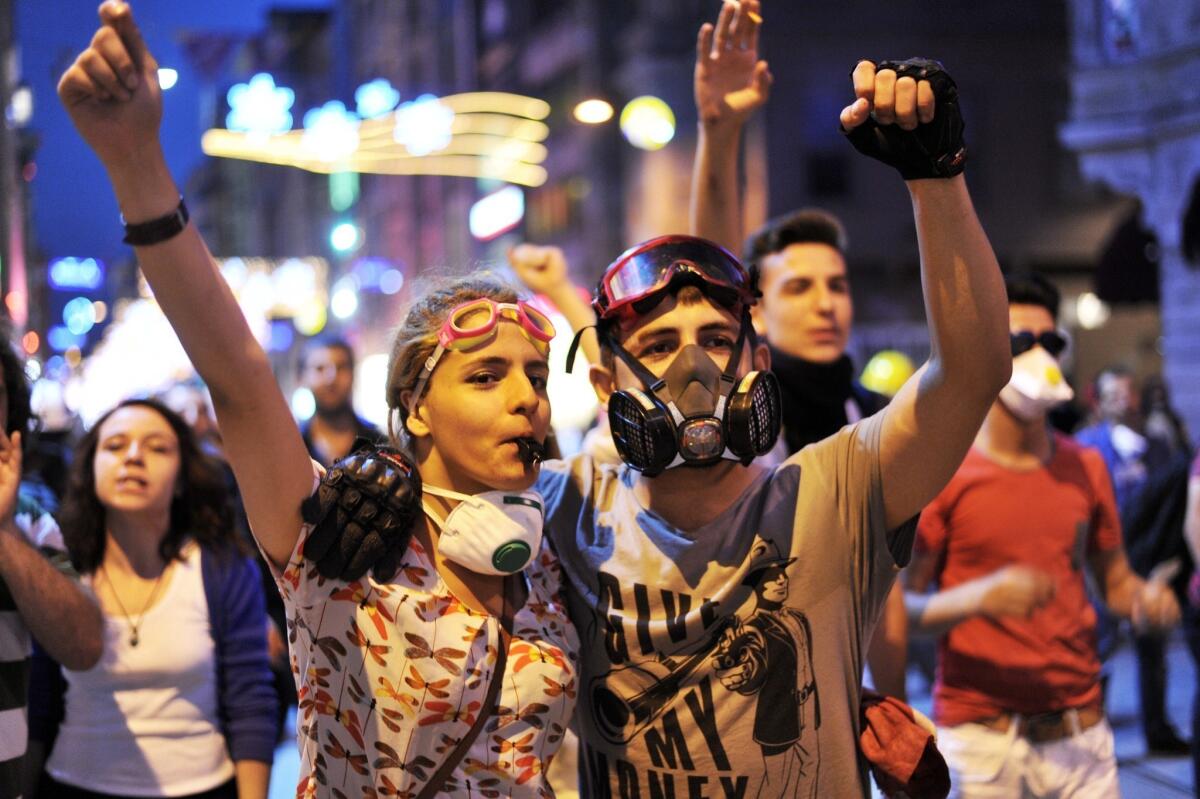Turkey overreacts

- Share via
Gezi Park is not Tiananmen Square and Turkey is not Communist China. Still, the heavy-handed evacuation of protesters from the public park in Istanbul over the weekend was unworthy of a democratically elected government. And Prime Minister Recep Tayyip Erdogan’s claim that his opponents were the tools of foreigners and criminals is reminiscent of the rants of dictators.
On Saturday, riot police firing tear gas scattered demonstrators who had gathered in the park to protest plans for the construction on the site of a replica of an Ottoman-era military barracks and possibly a mosque as well. The demonstrators had refused to leave despite assurances from the government that the project wouldn’t go forward until after a court ruling and perhaps a referendum. Meanwhile, protests have proliferated and on Monday Turkey’s deputy prime minister said that the army might be mobilized to put down unrest.
Erdogan should move quickly to de-escalate this 3-week-old confrontation with his critics, many of whom are secular-minded Turks distrustful of the Islamist roots of the ruling Justice and Development Party. If the divide is instead exacerbated, Turkey could suffer not only domestically but on the world stage as well. Even before Saturday’s crackdown on protesters, France’s minister for European affairs warned that police repression threatened the resumption of negotiations on Turkey’s admission to the European Union.
VIDEO: Demonstrators in Los Angeles raise awareness about Turkish protests
Turkey, a nation of 75 million people, bridges Europe and Asia and is a member of NATO. Under the Justice and Development Party, which came to power in 2002, it has served as an experiment of sorts in Islamic democracy. Compared with other Islamic nations such as Iran or Saudi Arabia, the influence of religion on public life has been minimal in Turkey, even since Erdogan entered office. Democratic elections have been less restrictive and more vibrant.
Still, secular Turks have bridled at recent moves to impose religious rules, including restrictions on the consumption of alcohol. They fear that the Erdogan, with the support of a large, conservative religious base outside the cities, is growing increasingly autocratic and is slowly moving the country away from the secular principles of the father of modern Turkey, Kemal Ataturk. They can hardly be reassured when they hear the prime minister say that “we take no orders or instruction from anyone but God.”
Last year a task force on U.S.-Turkey relations co-chaired by former Secretary of State Madeleine Albright and former national security advisor Stephen Hadley urged that the new establishment in Turkey “reassure secular-minded Turks that their way of life has a place in Turkish society, even if secularists failed to do the same for observant Muslims during their long period of ascendancy.” It will be easier for Erdogan to restore order if he makes that message his own.
More to Read
A cure for the common opinion
Get thought-provoking perspectives with our weekly newsletter.
You may occasionally receive promotional content from the Los Angeles Times.






